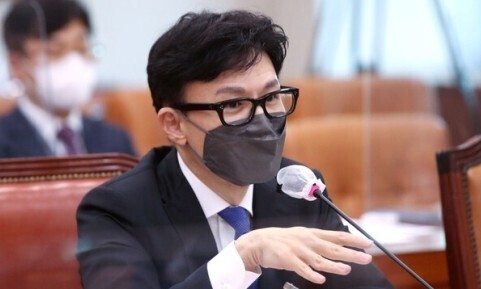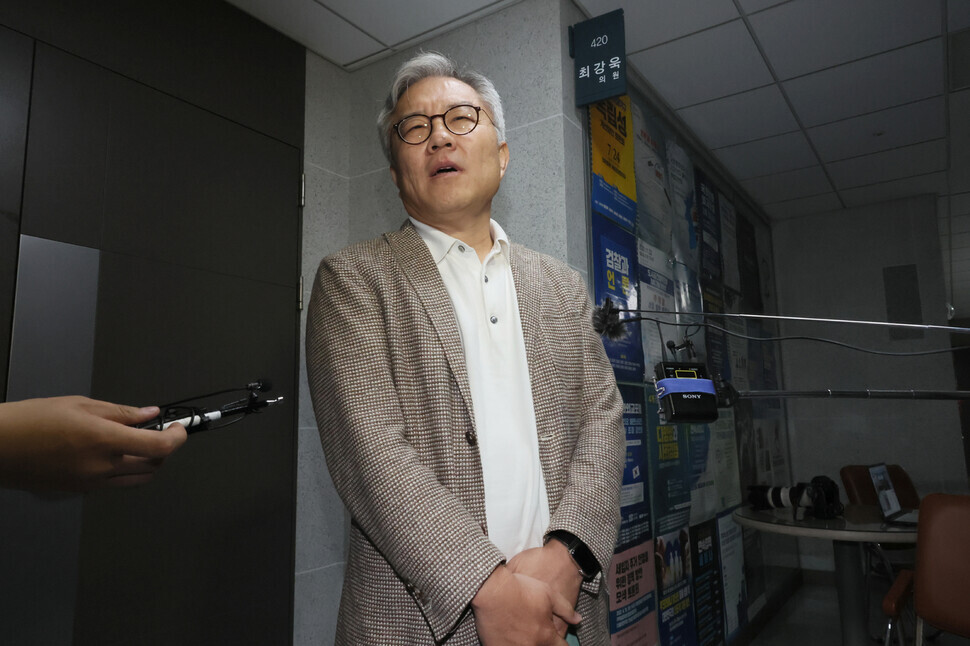hankyoreh
Links to other country sites 다른 나라 사이트 링크
Alleged leak of justice minister’s personal info sparks debate on press freedoms

Debate is growing over the interpretation and application of personal information protection legislation in Korea after police launched investigations into lawmakers and reporters for allegedly leaking materials from Justice Minister Han Dong-hoon’s confirmation hearings to third parties.
There are concerns that a rigid interpretation of the law could constrict the press’s ability to cover the news.
As it stands, Korea’s Personal Information Protection Act stipulates data management responsibilities on those who collect and process personal information. Because journalists are bound to come across personal data in the course of their investigations and reporting, increasing the burden of such responsibilities on the media may cause them to become cautious with what they report.
This is why Article 58, the press disclaimer, was created. It exempts “personal information collected or used for its own purposes of reporting by the press” from other prescriptions in the law.
Personal information is any information that can directly or indirectly identify a specific individual. It can range from sensitive information such as national identification numbers to portal and social media usernames and mobile phone numbers.
However, despite the disclaimer, the law’s Article 59 is the reason an MBC journalist and others were booked as suspects in the justice minister’s case.
The second clause of Article 59 prohibits the “divulgement of personal information acquired in the course of business, or to provide it for any third party’s use without authority.” This is where the immunity and punishment clauses collide and interpretations diverge.
The police believe that the scope of Article 58’s immunity and Article 59’s penalties are different. They believe that Article 58 exempts “collection and use” while Article 59 punishes “provision.”

The police believe that Han’s confirmation hearing materials were provided by the office of lawmaker Choe Kang-wook of the Democratic Party of Korea to an MBC reporter surnamed Lim, and then to Yeollin Gonggam TV.
The police are investigating the process of how the information was relayed from Choe to the MBC reporter, and how the MBC reporter may have then handed the information to Yeollin Gonggan TV, claiming that it contravenes the “provision” of information that is prohibited by Article 59.
This interpretation may be in disagreement with the purpose of Article 58. If we accept the logic that it is legal to “collect” personal information in the course of reporting by the press, but punish those who “provide” it to the media, “collection” itself becomes impossible. This is why there are concerns that Article 59 could be used as a weapon to nullify Article 58.
In a statement, OpenNet, a civic organization that advocates for legislation related to personal information protection, released a statement.
“If the person who provided the minister’s personal information or the person who received the information used the information for media coverage, it doesn’t constitute an offense,” the group said. “If Article 59 is interpreted narrowly, all of Article 58’s provisions for protecting freedom of speech protection become meaningless.”
Park Kyung-sin, a professor at Korea University Law School, also told Hankyoreh, “The Personal Information Protection Act should be enforced so that freedom of expression and freedom of the press are not infringed. That’s why Article 58 exists as a disclaimer, and it should be considered when interpreting Article 59.”
Experts worry that the law could be used as a pretext to curtail the media’s role as a check and balance on power. The presidential office has already publicly protested an article by Kyunghyang Shinmun released in October 2022 that reported the identities of employees of the presidential office, calling it a violation of the Personal Information Protection Act.
Charges of violating the Personal Information Protection Act are simpler than defamation under the Criminal Act, and are not an offense unpunishable over objection (requiring a complaint by the victim for prosecution). It’s not hard to see how such charges could serve a purpose of pressuring the media.
“It is inevitable that the press will be forced into self-censorship if the law is repeatedly used as a weapon against it,” OpenNet said.
By Shim Wu-sam, staff reporter
Please direct questions or comments to [english@hani.co.kr]

Editorial・opinion
![[Correspondent’s column] The real reason the US is worried about Chinese ‘overcapacity’ [Correspondent’s column] The real reason the US is worried about Chinese ‘overcapacity’](https://flexible.img.hani.co.kr/flexible/normal/500/300/imgdb/original/2024/0510/5217153290112576.jpg) [Correspondent’s column] The real reason the US is worried about Chinese ‘overcapacity’
[Correspondent’s column] The real reason the US is worried about Chinese ‘overcapacity’![[Editorial] Yoon’s gesture at communication only highlights his reluctance to change [Editorial] Yoon’s gesture at communication only highlights his reluctance to change](https://flexible.img.hani.co.kr/flexible/normal/500/300/imgdb/original/2024/0510/7717153284590168.jpg) [Editorial] Yoon’s gesture at communication only highlights his reluctance to change
[Editorial] Yoon’s gesture at communication only highlights his reluctance to change- [Editorial] Perilous stakes of Trump’s rhetoric around US troop pullout from Korea
- [Guest essay] Preventing Korean Peninsula from becoming front line of new cold war
- [Column] The state is back — but is it in business?
- [Column] Life on our Trisolaris
- [Editorial] Penalties for airing allegations against Korea’s first lady endanger free press
- [Editorial] Yoon must halt procurement of SM-3 interceptor missiles
- [Guest essay] Maybe Korea’s rapid population decline is an opportunity, not a crisis
- [Column] Can Yoon steer diplomacy with Russia, China back on track?
Most viewed articles
- 1[Correspondent’s column] The real reason the US is worried about Chinese ‘overcapacity’
- 2[Book review] Who said Asians can’t make some good trouble?
- 3Korea poised to overtake Taiwan as world’s No. 2 chip producer by 2032
- 4[Editorial] Yoon’s gesture at communication only highlights his reluctance to change
- 5Yoon voices ‘trust’ in Japanese counterpart, says alliance with US won’t change
- 6Yoon rejects calls for special counsel probes into Marine’s death, first lady in long-awaited presse
- 7Korea likely to shave off 1 trillion won from Indonesia’s KF-21 contribution price tag
- 8S. Korea “monitoring developments” after report of secret Chinese police station in Seoul
- 9Nuclear South Korea? The hidden implication of hints at US troop withdrawal
- 10‘Free Palestine!’: Anti-war protest wave comes to Korean campuses